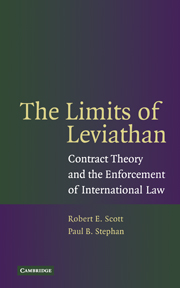Book contents
- Frontmatter
- Contents
- Foreword
- 1 Introduction
- 2 States, Firms, and the Enforcement of International Law
- 3 Lessons from Contract Theory
- 4 A Model of Optimal Enforcement
- 5 Patterns of International Law Enforcement
- 6 The Choice between Formal and Informal Enforcement
- 7 The Future of International Law and Its Enforcement
- Glossary
- Table of Authorities
- Index
6 - The Choice between Formal and Informal Enforcement
Published online by Cambridge University Press: 29 July 2009
- Frontmatter
- Contents
- Foreword
- 1 Introduction
- 2 States, Firms, and the Enforcement of International Law
- 3 Lessons from Contract Theory
- 4 A Model of Optimal Enforcement
- 5 Patterns of International Law Enforcement
- 6 The Choice between Formal and Informal Enforcement
- 7 The Future of International Law and Its Enforcement
- Glossary
- Table of Authorities
- Index
Summary
Against the force of such considerations, we find respondents' countervailing arguments quite unpersuasive. Their basic contention is that United States courts could make a significant contribution to the growth of international law, a contribution whose importance, it is said, would be magnified by the relative paucity of decisional law by international bodies. But given the fluidity of present world conditions, the effectiveness of such a patchwork approach toward the formulation of an acceptable body of law concerning state responsibility for expropriations is, to say the least, highly conjectural. Moreover, it rests upon the sanguine presupposition that the decisions of the courts of the world's major capital exporting country and principal exponent of the free enterprise system would be accepted as disinterested expressions of sound legal principle by those adhering to widely different ideologies.
Banco Nacional de Cuba v. Sabbatino, 376 U.S. 398, 434–35 (1964) (Harlan, J.)Without doubt there are great interests of society which justify withholding the coercive arm of the law from these duties of imperfect obligation, as they are called; imperfect, not because they are less binding upon the conscience than those which are called perfect, but because the wisdom of the social law does not impose sanctions upon them.
Mills v. Wyman, 20 Mass. (3 Pick.) 207, 210 (1825) (Parker, J.)In this chapter, we demonstrate that most, if not all, contemporary practice of international law enforcement conforms to predictions generated by the model of optimal enforcement that we developed in Chapter 4.
- Type
- Chapter
- Information
- The Limits of LeviathanContract Theory and the Enforcement of International Law, pp. 147 - 179Publisher: Cambridge University PressPrint publication year: 2006



